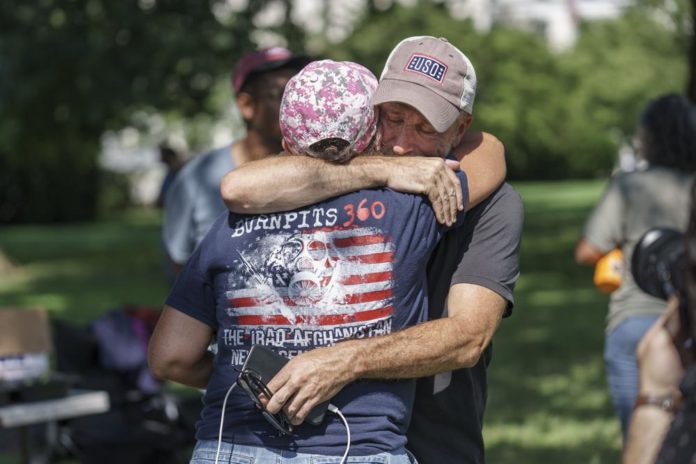
A bill enhancing health care and disability benefits for millions of veterans exposed to toxic burn pits is expected to win final approval in the Senate on Tuesday, ending a brief stalemate over the measure that had infuriated advocates and inspired some to camp outside the Capitol.
President Joe Biden has pushed for the legislation, saying the measure “makes good on our sacred obligation” to care for veterans and their families.
The Senate overwhelmingly approved the legislation once before, but it required a do-over for a technical fix. But the process derailed when Republicans made a late attempt to change another aspect of the bill last week and blocked it from advancing. The abrupt delay outraged veterans groups and advocates, including comedian Jon Stewart. It also placed GOP senators in the uncomfortable position of delaying the top legislative priority of service organizations this session of Congress.
A group of veterans and their families have been camping out at the Capitol since that vote. Senate Majority Leader Chuck Schumer, D-N.Y., said he had good news for them, announcing a final vote for Tuesday evening.
“Veterans who were exposed to the toxic fumes of burn pits will be treated by the VA like they should have been from the beginning,” Schumer said.
Some Democrats have questioned whether Republicans blocked the bill for spite, after an announcement just hours earlier that key Democrats had agreed on a way forward on a health, energy, and tax bill that Republicans oppose and may be unable to stop.
“Wait a minute. You’re not going to help our veterans because we want to lower the cost of prescription drugs, because we want to lower the cost of health care, because we want to protect the planet? Of course, you don’t agree with any of those things, but would you use that to vote against our veterans?” House Speaker Nancy Pelosi, D-Calif., said at a press conference last week. “It’s really immoral, almost criminal.”
Republican senators rejected that charge and said the changes they seek would not affect spending for veterans in the bill.
The bill contains two major components for veterans who served in Iraq and Afghanistan. Veterans who served near burn pits will get ten years — rather than five — of enhanced health care coverage through the Department of Veterans Affairs upon their separation from the military.
Second, the legislation directs the VA to presume that certain respiratory illnesses and cancers were related to burn pit exposure, allowing veterans to obtain disability payments to compensate for their injury without having to prove the illness was a result of their service.
Roughly 70% of disability claims related to burn pit exposure are denied by the VA due to lack of evidence, scientific data, and information from the Defense Department.
The military used burn pits to dispose of such things as chemicals, cans, tires, plastics, and medical and human waste.
Hundreds of thousands of Vietnam War-era veterans and survivors also stand to benefit from the legislation. The bill adds hypertension, or high blood pressure, as a presumptive disease associated with Agent Orange exposure. The Congressional Budget Office projected that about 600,000 of 1.6 million living Vietnam vets would be eligible for increased compensation, though only about half would have a severe enough diagnosis to warrant more compensation.
Also, veterans who served in Thailand, Cambodia, Laos, Guam, American Samoa, and Johnston Atoll will be presumed to have been exposed to Agent Orange. That’s another 50,000 veterans and survivors of deceased veterans who would get compensation for illnesses presumed to have been caused by their exposure to the herbicide, the CBO projected.
The bill is projected to increase federal deficits by about $277 billion over ten years and does not include offsetting spending cuts or tax increases to help pay for it.
When the CBO scored the bill, it projected that nearly $400 billion spent on VA services would take place as mandatory spending rather than discretionary spending. The Committee for a Responsible Federal Budget, a nonpartisan fiscal watchdog, said a reclassification to mandatory would “both reduce the pressure to keep those costs under control and make it easier for appropriators to spend more elsewhere in the budget without offsets.”
Sen. Pat Toomey, R-Pa., is seeking a vote for an amendment that he said would not change the spending slated for veterans programs but how the government accounts for that spending.
However, the dynamics Toomey has spoken about also applied to the bill when the Senate voted on it in June. Senators then voted for the measure by a resounding vote of 84-14, raising questions about why Republicans voted against advancing the do-over effort last week.
Advocacy groups for veterans, a key voting bloc in the upcoming midterm elections, were furious and ramped up the political pressure on lawmakers to act.
At a Capitol Hill news conference the day after last week’s procedural vote, speakers used terms such as “villains” and “reprehensible” to describe the Republican senators who voted against advancing the measure last week but voted for almost the exact same bill in June.
“Veterans are angry and confused at the sudden change from those they thought had their backs,” said Cory Titus of the group Military Officers Association of America.
Sen. Kirsten Gillibrand, D-N.Y., said the veterans camped out at the Capitol are exhausted and want to go home.
“But they will not. They will not go home until the job is done,” Gillibrand said.
Republished with the permission of The Associated Press.













